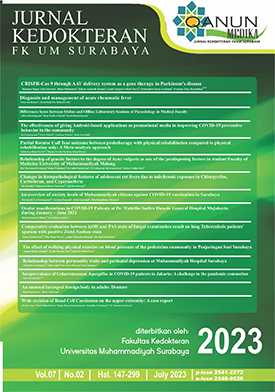Differences score between online and offline laboratory sessions of parasitology in Medical Faculty
Abstract
Capabilities to diagnose diseases caused by parasites is one of the competencies that must be mastered by general practitioners. This is stated in Standar Kompetensi Dokter Indonesia (SKDI). The branch of parasitology includes protozoa, helminths, and arthropods. Competency can be achieved through debriefing activities and laboratory sessions. During the pandemic, laboratory sessions of parasitology are carried out online with modification of implementation techniques. The study aims to determine the differences in scores between online and offline laboratory sessions of parasitology in medical faculty. Quantitative research used a quasi-experimental method, with a simple random sampling technique. The research data used secondary data scores of laboratory sessions of helminth and protozoa parasitology of Medical students in Universitas Muhammadiyah Semarang (Unimus). Data were analyzed by using a non-parametric Mann-Whitney u-test. From 62 students, there were significant differences in scores between online and offline helminth laboratory sessions (p=0.00) with the average scores of online helminth courses higher than offline laboratory sessions (70.6±19.8). There was no significant difference in grades of online and offline protozoa laboratory sessions (p=0.576) with average scores of online protozoa courses being lower than the offline laboratory session (55.8±25.5). There is a significant difference in scores between the helminth laboratory session of parasitology and there is no difference in scores between the protozoa laboratory session in Medical Faculty.
Full text article
References
Baharuddin, & Wahyuni, E. N. (2019). Teori Belajar dan Pembelajaran. Ar-Ruzz Media.
Ekantini, A. (2020). Efektivitas Pembelajaran Daring pada Mata Pelajaran IPA di Masa Pandemi Covid-19: Studi Komparasi Pembelajaran Luring dan Daring pada Mata Pelajaran IPA SMP Anita. Jurnal Pendidikan Madrasah, 5(2), 187–194. http://ejournal.uin-suka.ac.id/tarbiyah/index.php/JPM/article/view/3511
Hidayat, D. R., Rohaya, A., Nadine, F., & Ramadhan, H. (2020). Kemandirian Belajar Peserta Didik Dalam Pembelajaran Daring Pada Masa Pandemi Covid -19. Perspektif Ilmu Pendidikan, 34(2), 147–154. https://doi.org/10.21009/pip.342.9
Kemenkes RI. (2015). PENYAKIT KECACINGAN MASIH DIANGGAP SEPELE. Kementrian Kesehatan Republik Indonesia. https://www.kemkes.go.id/article/view/1135/penyakit-kecacingan-masih-dianggap-sepele.html
Kemenkes RI. (2017). Permenkes NO.15 Tahun 2017 Tentang Penanggulangan Cacingan. Menteri Kesehatan Republik Indonesia.
Konsil Kedokteran Indonesia. (2012). Standar Kompetensi Dokter Indonesia (SKDI). Konsil Kedokteran Indonesia.
Mustakim, M. (2020). Efektivitas Pembelajaran Daring Menggunakan Media Online Selama Pandemi Covid-19 Pada Mata Pelajaran Matematika. Al Asma : Journal of Islamic Education, 2(1), 1. https://doi.org/10.24252/asma.v2i1.13646
Nguyen, T. (2015). The Effectiveness of Online Learning: Beyond No Significant Difference and Future Horizons. MERLOT Journal of Online Learning and Teaching, 11(2), 309–319.
Nurhalimah, Fitriayuningsih, D., Haryati, O., & Rahayuningtyas, D. K. (2021). Faktor-Faktor yang Mempengaruhi Efektifitas Praktik Laboratorium Daring Pada Masa Pandemi Covid-19. 6(1).
Prabowo, A. A., & Wardani, D. K. (2021). Faktor-Faktor Yang Mempengaruhi Kecurangan Akademik Pada Perkuliahan Online (Studi Pada Mahasiswa Akuntansi Universitas Sarjanawiyata Tamansiswa). Jurnal Kajian Bisnis, 29(1), 16–29.
Pramana, E. J. W., & Atmaja, G. A. M. (2020). Pengembangan Modul Focusky Parasitologi Pada Program Studi Pendidikan Biologi Ikip Budi Utomo Malang. Jurnal Pendidikan Biologi, 12(1), 22–29.
Rozaliyani, A., Widjaja, H. T., Prawiroharjo, P., & Sukarya, W. (2020). Kajian Etik Pendidikan Jarak Jauh dalam Pendidikan Kedokteran di Indonesia. Jurnal Etika Kedokteran Indonesia, 4(2), 57. https://doi.org/10.26880/jeki.v4i2.49
Sari, P. (2015). Memotivasi Belajar Dengan Menggunakan E-Learning. Ummul Quro, 6(2), 20–35.
Sataloff, R. T., Johns, M. M., & Kost, K. M. (2016). mikrobiologi dan parasitologi Keperawatan. Kementrian Kesehatan Republik Indonesia.
Siemens, G., & Shane, D. (2015). Preparing for the Digital University: a review of the history and current state of distance, blended, and online learning. ICT4D Bibliography. http://linkresearchlab.org/PreparingDigitalUniversity.pdf
Suryawan, I. P. P., & Permana, D. (2020). Media Pembelajaran Online Berbasis Geogebra sebagai Upaya Meningkatkan Pemahaman Konsep Matematika. Prisma, 9(1), 108. https://doi.org/10.35194/jp.v9i1.929
Syafi’i, A., Marfiyanto, T., & Rodiyah, S. K. (2018). Studi Tentang Prestasi Belajar Siswa Dalam Berbagai Aspek Dan Faktor Yang Mempengaruhi. Jurnal Komunikasi Pendidikan, 2(2), 115. https://doi.org/10.32585/jkp.v2i2.114
Weldy, T. G. (2018). Traditional, Blended, or Online: Business Student Preferences and Experience with Different Course Formats. Journal of Business Education & Scholarship of Teaching, 12(2), 55–62.
WHO. (2018). Deworming: every girl and every woman has the right to be treated. World Health Organization. https://www.who.int/news/item/02-02-2018-deworming-every-girl-and-every-woman-has-the-right-to-be-treated
WHO. (2021). Deworming women during pregnancy has a positive effect on child survival and health. World Health Organization. https://www.who.int/news/item/29-04-2021-deworming-women-during-pregnancy-has-a-positive-effect-on-child-survival-and-health
Authors
Copyright (c) 2023 Atika Widyaningrum, Mega Pandu Arfiyanti, Kanti Ratnaningrum

This work is licensed under a Creative Commons Attribution 4.0 International License.

Qanun Medika by FK UM Surabaya is liscence under Lisensi Creative Commons Atribusi 4.0 Internasional.

